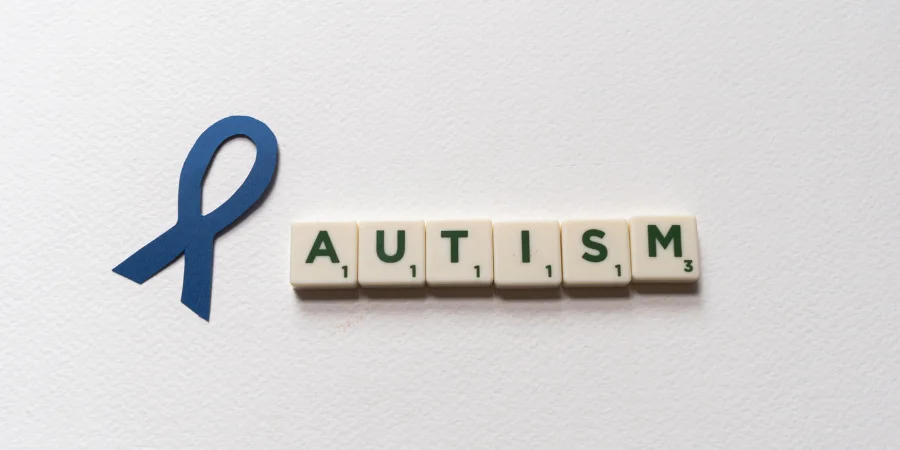Last Updated:
August 7th, 2025
Autism and Addiction | Symptoms and Treatment
Autism Spectrum Disorder (ASD) is a condition that brings with it a range of opinions and misconceptions about what it means to have. Around 700,000 adults and children in the UK have autism, and statistics show that one in every hundred people is on the autism spectrum.
Those diagnosed with ASD can also struggle with addiction, and when this happens, it is referred to as a co-occurring disorder. Unfortunately, being on the autism spectrum whilst also navigating addiction can feel like a particularly overwhelming task – one which might seem near impossible without the right support. If you are an individual with autism that is also suffering from addiction, it is vital that you seek the treatment that you deserve to overcome this affliction. Read on for more on the dual diagnosis of autism and addiction and the signs and symptoms that will help to navigate this situation.

What is autism?
Autism is a developmental disorder which directly impacts how individuals communicate and engage with the outside world. It is important to note that autism is a spectrum condition, meaning it presents itself differently in each person that is diagnosed. For example, one individual with autism might display symptoms similar to attention deficit hyperactivity disorder (ADHD), while another may behave quite the opposite, appearing quiet and withdrawn from those around them.
While no two people with autism are the same, and it will vary from person to person, some common symptoms associated with autism include:
- Struggles with social interaction
- Trouble with transitions (such as starting school or at a new job)
- Difficulty with expression (both verbal and non-verbal)
- Intense, somewhat excessive interest in specific topics
- Repetitive, ritualistic behaviours
- Sensory issues (such as heightened sensitivity to sound, touch, or textures)
Why do those with autism suffer from addiction?
Addiction is a condition that is characterised by a compulsive urge to seek out a behaviour, even if it is causing noticeable harm to health and wellbeing. Addiction is an illness that does not discriminate and can impact any of us at any time. Therefore, just because someone is suffering from a pre-existing condition like autism, this does not make them immune from falling into addictive behaviours. In fact, a recent study found that autistic adults are nearly nine times more likely to admit to using recreational drugs (such as marijuana, amphetamines and cocaine) to manage unwanted symptoms associated with their condition.
The reasons for addiction developing will be unique and specific to each person. For those with ASD, this is no different, although there may be additional reasons that their addiction took hold. For example:
- Some individuals with ASD have admitted to using substances, such as alcohol or drugs, to mask their autism or ‘blend in’ and feel more accepted by those in their peer group.
- Others turn to addictive behaviours to help manage or control particularly distressing emotions.
- Drugs, in particular, have also been found in those with ASD to reduce sensory overload, help with mental focus, and provide routine.

Some things you might not know about autism
As autism is a condition often misunderstood by those without it, we thought we would break down some interesting facts about ASD below:
Just like those without the condition, people with autism do have emotions…
Unfortunately, it is all too common for others to be misguided about what it means to have autism, under the impression that those with ASD lack emotion or feelings. This is a claim that is very offensive to those with the condition, as it is entirely unfounded. Those with autism, just like anyone else, can experience the full range of human emotions; they just express these emotions differently. In fact, research shows that those on the autism spectrum can experience emotions like empathy in a manner that is more intense than your average neurotypical individual. With this information in mind, it is understandable why those with ASD could turn to addictive behaviours, using it as a method to escape uncomfortable feelings or powerful emotions.
Autism is a lifelong condition that affects all ages…
The focus of autism seems to be very much on young children, with less emphasis placed on older individuals with the condition. This can lead many to forget that autism is a condition which stays with you for life; it should not be overlooked just because it is not visible. In fact, one study discovered a link between undiagnosed ASD in young adults and substance use disorder. Addiction treatment can be a very effective tool in helping clients understand more about themselves, and through therapy, some individuals have discovered that they themselves were on the autism spectrum, living their lives for years without the surety of a formal diagnosis.
Autism is all around us…
Autism is a condition that exists all around us, presenting itself differently for everyone who has it. However, as a lot of people have preconceived ideas of what ASD ‘looks like’, they often forget that every individual who crosses their path is unique, possessing a personal set of strengths and limitations. In fact, a great deal of people on the autism spectrum regard their ASD as an essential part of who they are, something which makes them unique and individual.
If you have ASD and are fearful of engaging with addiction treatment, we wish to assure you that while addiction is a condition that develops over time, often in response to unresolved issues or traumatic events, autism is not. Our goal at Primrose Lodge is not to address your autism but simply to work together and identify some of the underlying reasons that your addiction took hold and develop healthier coping strategies to ensure you no longer need to turn to these addictive behaviours again.

We are here to help
At Primrose Lodge, we understand just how difficult it can be to enter rehab treatment if you have a pre-existing condition. Perhaps you are anxious to enter a new space, join groups and communicate with a group of people that you do not know. However, with a team of dedicated staff, our main objective is to keep you as safe and comfortable as possible as you begin this journey toward health and healing.
While we do not treat autism directly, our facility strives to accommodate for any requirements you might have, utilising a variety of treatments such as Cognitive Behavioural Therapy (CBT) and Mindfulness to help address your condition holistically. If you would like any more information about our facility on all that we have to offer you, do not hesitate to give us a call today.

